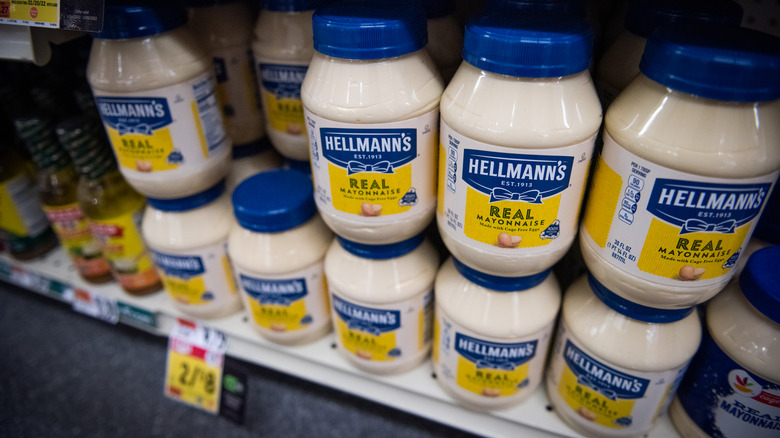Does Mayonnaise Need To Be Refrigerated?
Mayonnaise: Whether you love it or you hate it, you've most likely eaten it at least once. The spreadable condiment can be found in a variety of different dishes and types of cuisines. From sandwiches to potato salad, this versatile emulsion provides a moist, velvety texture and rich yet tangy flavor. The recipe for mayonnaise is simply a combination of oil, egg yolks, and a dash of lemon juice or vinegar. With these few ingredients and a blender or a whisk, you can easily make your own homemade mayonnaise, although many people prefer to buy it from reliable mayonnaise brands like Hellmann's and Best Foods for its convenience and longevity.
When searching for mayo at the grocery store, you'll likely find it on a shelf next to other pantry staples and then head home to store it in the refrigerator. But is this really necessary? Does mayonnaise actually need to be refrigerated? After all, the spread contains raw eggs, which are a prime candidate for refrigeration. According to the USDA and Food Science & Nutrition, mayo is safe to eat at room temperature, and does not need to be refrigerated. However, there are a few details to consider.
Does unopened mayo need to be refrigerated?
Just like how it is kept on grocery store shelves, unopened mayo is perfectly safe to be stored in your pantry rather than your fridge. While it may feel a bit unnatural at first, especially if you've gotten used to adding a new jar of mayo to the shelf of your fridge door after purchase, you don't need to take up valuable refrigerated real estate if you don't want to.
The raw egg within store-bought mayo is balanced out by the vinegar and lemon juice content, providing a safe food that will not spoil in a room temperature environment. As long as it is stored somewhere relatively cool and dry, your mayo will be safe to enjoy until it has hit the printed expiration date. If unopened, a jar of mayo may stay edible for up to six months past its expiration date, according to findings from the International Journal of Environmental Research and Public Health. Once you've cracked it open, however, things get slightly more complicated.
Does opened mayo need to be refrigerated?
Surprisingly, opened mayo does not need to be refrigerated unless the packaging explicitly specifies it. As long as the condiment remains in a sealable jar or container, it can be placed back on your counter or pantry for up to two months, according to FoodSafety.gov. However, there are benefits to storing an opened jar of mayo in the fridge. Refrigerating your spread will help prolong its integrity, in some cases up to two months longer after opening. The cool environment can also help maintain that fresh flavor that fans of the condiment expect when adding it to their favorite meals. After a jar of mayo has been opened, keep it in its resealable container with the lid fully tightened until its next use.
It's also important to pay attention to the specific brand instructions. Hellmann's mayo specifically instructs users to "refrigerate after opening" to prevent separation and variation in flavor. Funnily enough, the squeeze bottle versions of this particular brand do not require refrigeration, although all other forms will taste best chilled. For mayonnaise that sports a "refrigerate after opening" label, you will have roughly two months after opening to enjoy it before it starts to turn, even when stored in the fridge, as noted by the USDA.
How long can an opened jar of mayo be left out?
Have you ever prepared yourself a tasty looking sandwich and decided to leave the ingredients out just in case you are hungry and want to come back for seconds? Whether it was intentionally left on the counter or you forgot to seal and return your mayo to its proper home, rest assured that the spread is still safe to enjoy, at least for a few hours. According to the FDA, mayo can safely sit on your counter without being sealed for up to two hours before it begins to become affected by the outside elements.
After two hours, mayonnaise and even foods containing a high mayonnaise content, such as potato salad, have an increased risk of spoiling — especially in hotter temperatures. Consuming mayonnaise that has been sitting out too long can lead to digestive discomfort and other foodborne illnesses. If you happen to leave your mayo uncovered in the kitchen all day or even overnight, you should probably toss it for safety.
Why don't restaurants refrigerate mayo?
While store-bought mayonnaise can be stored in the pantry even after opening, many brands highly recommend keeping it cool after the seal is broken to maintain freshness. However, many restaurants don't follow this same protocol when serving mayonnaise. Restaurant-grade mayo often has additional preservatives and special mixes that ensure it is safely stored at room temperature longer than most store-bought jars. This allows restaurants to provide customers with easy access to the spread without constantly stopping to restock and refrigerate.
Small, single serving packages of mayonnaise act the same way — if you've ever grabbed a burger at a ball game or an outdoor snack bar and seen packets of mayo next to the ketchup and mustard, don't be alarmed. Sealed packages of mayo will not go bad unless the expiration date has passed. For example, French's Real Mayonnaise single-serve packets have a shelf-life of 180 days. Still, it's probably a good idea to look out for any funky smells or discoloration before enjoying it in case the packets were stored in a less-than-optimal place before serving.




